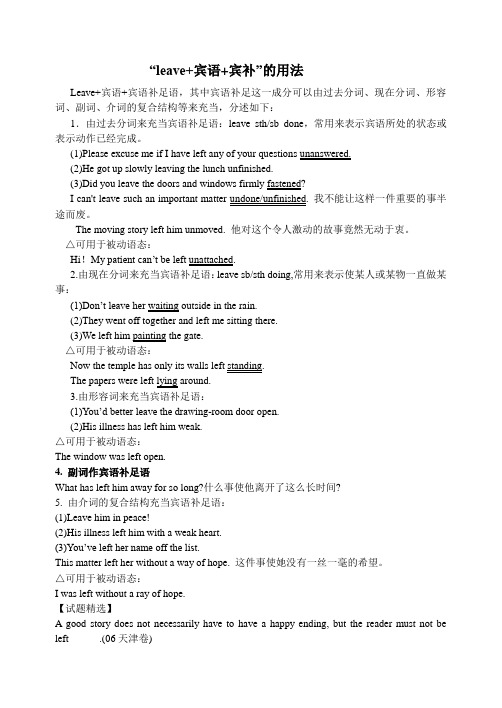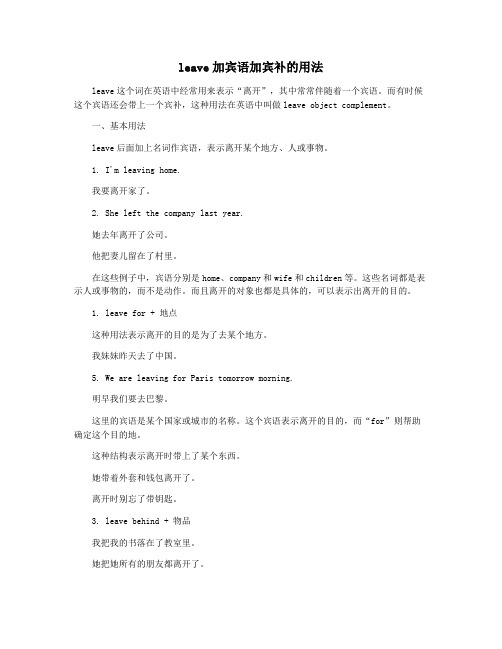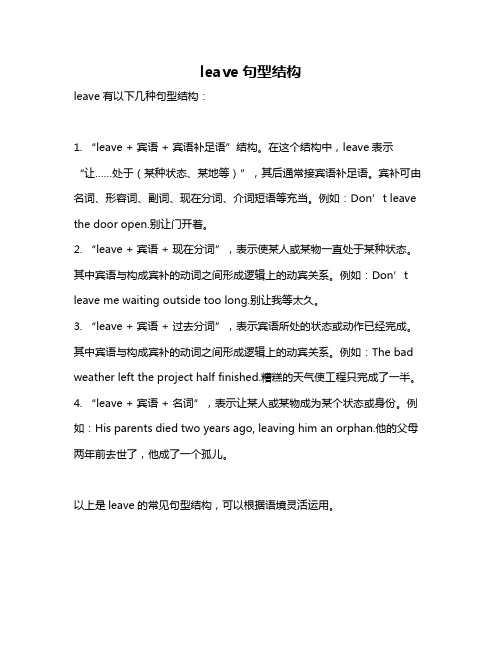leave 宾语 宾补
leave+宾语+宾补的用法

创作编号:GB8878185555334563BT9125XW创作者:凤呜大王*“leave+宾语+宾补”(即leave复合结构)的用法总结Leave+宾语+宾语补足语,其中宾语补足语这一成分可以由过去分词、现在分词、形容词、副词、介词的复合结构等来充当,意思是”使.....处于…..状态;听任;让”现分述如下:1.由过去分词来充当宾语补足语:leave sth/sb done,常用来表示宾语所处的状态或表示动作已经完成。
(宾语和宾补被动关系)(1)He got up slowly, leaving the lunch unfinished.(2)Did you leave the doors and windows firmly fastened?(3)I can't leave such an important matter undone/unfinished. 我不能让这样一件重要的事半途而废。
The moving story left him unmoved. 他对这个令人激动的故事竟然无动于衷。
2.由现在分词来充当宾语补足语:leave sb/sth doing,常用来表示使某人或某物一直做某事(宾语和宾补被动关系).waiting outside in the rain.(2)They went off together and left me sitting there.(3)We left him painting the gate. △可用于被动语态:The papers were left lying around.3.由形容词来充当宾语补足语:(1)You’d better leave thedrawing-room door open.(2)His illness has left him weak.△可用于被动语态:The window was left open.4.由副词作宾语补足语(1)What has left him away for so long?什么事使他离开了这么长时间?(2)We can’t leave the light on when leaving.5. 由介词的复合结构充当宾语补足语:(1)Leave him in peace!(2)His illness left him with a weak heart.(3)You’ve left her name off the list.(4)This matter left her without a way of hope. 这件事使她没有一丝一毫的希望。
leave的六种宾补结构

leave的六种宾补结构Leave的六种宾补结构Leave是一个常用的动词,它可以用来表示离开某个地方或情况。
在句子中,leave可以带有宾补结构,用来进一步说明离开的方式、目的或结果。
本文将介绍leave的六种常见宾补结构,分别是leave sb. + adj., leave sb. + n., leave sb. + to do sth., leave sb. + v.-ing, leave sb. + adv. 和 leave sb. + prep. phrase。
一、leave sb. + adj.(使某人处于某种状态)这种结构表示离开后留下某人处于某种状态,常用于描绘情感或心理状态。
例如:1. I was deeply moved by the movie. It left me speechless.(那部电影让我深受感动,让我无言以对。
)2. The news of her promotion left me envious.(她晋升的消息让我羡慕不已。
)二、leave sb. + n.(使某人处于某种状态)这种结构表示离开后留下某人处于某种状态,常用于描述具体的情况或感受。
例如:1. The loud noise left me with a headache.(那嘈杂的声音让我头疼不已。
)2. The unexpected rainstorm left us in a mess.(突如其来的暴雨让我们一片混乱。
)三、leave sb. + to do sth.(让某人去做某事)这种结构表示离开时将某人交给他人或自己去做某事。
例如:1. My boss left me to handle the project on my own.(我的老板让我自己负责处理这个项目。
)2. She left her children to play in the park while she went shopping.(她让孩子们在公园里玩耍,自己去购物。
leave+宾语+宾补

• 公式六.leave +宾语+ 名词 • The earthquake left him an orphan. • 公式七:leave +宾语+不定式 • She left her mother to take care of her baby.
_l_ea_v_e_the windows c_l_o_se_d____(让窗子关着)
• 2. Don’lte_a_v_e___himw_a_i_ti_n_g_(等着)outside in
the train.
• 3.He would like to l_e_av_e__the apple _u_n_e_a_te_n(未 吃完的)up and threw away.
• (1)Don’t leave her waiting outside in the rain. • (2)They went off together and left me sitting
there. • (3)We left him painting the gate. • They all waked out and left me sitting there all by
• A.leaving, unlocked B. leaving, unlocking
• C. left, unlocked D. to leave, unlocking
• 4. Don’t leave the water _A____ while you brush your
teeth. A. running
leave作为使役动词用时 leave +宾语+ 宾补
leave+宾语+宾补的用法

The movingstory left himunmoved.他对这个令人激动的故事竟然无动于衷。
2.由现在分词来充当宾语补足语:leave sb/sth doing,常用来表示使某人或某物一直做某事(宾语和宾补被动关系).
3.由形容词来充当宾语补足语:
(1)You’dbetter leavethe drawing-room dooropen.
(2)Hisillnesshaslefthimweak.
△可用于被动语态:
Thewindow wasleft open.
4.由副词作宾语补足语
(1)What haslefthimawayfor so long?什么事使他离开了这么长时间?
3.John rushed outin a hurry,______the door _______.
A.leaving, unlocked B. leaving, unlocking C.left,unlockedD.toleave, unlocking
4.Don’tleave the water______ whileyou brushyour teeth.
△可用于被动语态:
I wasleftwithout a ray of hope.
5.由名词作宾语补足语
The earthquakelefthim an orphan.
【试题精选】
1.Agoodstorydoes notnecessarilyhavetohaveahappyending,but thereadermust notbe left______.(06天津卷)
leave+宾语+宾补

“leave+宾语+宾补”的用法Leave+宾语+宾语补足语,其中宾语补足这一成分可以由过去分词、现在分词、形容词、副词、介词的复合结构等来充当,分述如下:1.由过去分词来充当宾语补足语:leave sth/sb done,常用来表示宾语所处的状态或表示动作已经完成。
(1)Please excuse me if I have left any of your questions unanswered.(2)He got up slowly leaving the lunch unfinished.(3)Did you leave the doors and windows firmly fastened?I can't leave such an important matter undone/unfinished. 我不能让这样一件重要的事半途而废。
The moving story left him unmoved. 他对这个令人激动的故事竟然无动于衷。
△可用于被动语态:Hi!My patient can’t be left unattached.2.由现在分词来充当宾语补足语:leave sb/sth doing,常用来表示使某人或某物一直做某事:(1)Don’t leave her waiting outside in the rain.(2)They went off together and left me sitting there.(3)We left him painting the gate.△可用于被动语态:Now the temple has only its walls left standing.The papers were left lying around.3.由形容词来充当宾语补足语:(1)You’d better leave the drawing-room door open.(2)His illness has left him weak.△可用于被动语态:The window was left open.4. 副词作宾语补足语What has left him away for so long?什么事使他离开了这么长时间?5. 由介词的复合结构充当宾语补足语:(1)Leave him in peace!(2)His illness left him with a weak heart.(3)You’ve left her name off the list.This matter left her without a way of hope. 这件事使她没有一丝一毫的希望。
leave make keep get have +宾语宾补

leave make keep get have +宾语宾补
以下是leave、make、keep、get、have作为动词,后面跟宾语和宾补的一些常见的短语:
- leave sb./sth. + 宾补:离开某人或某物
- make sb./sth. + 宾补:制作某人或某物
- keep sb./sth. + 宾补:保持某人或某物
- get sb./sth. + 宾补:得到某人或某物
- have sb./sth. + 宾补:拥有某人或某物
例如:
- He left his job and started a new career.(他离开了他的工作开始了新的职业生涯。
)
- She made a delicious cake for her birthday.(她为她生日做了一个美味的蛋糕。
)
- The cat kept me awake last night.(猫昨晚让我失眠了。
)
- I got a new phone as a gift from my friend.(我从我的朋友那里得到了一部新手机。
)
- She has a beautiful garden in her backyard.(她的后院有一个美丽的花园。
)。
leave加宾语加宾补的用法

leave加宾语加宾补的用法leave这个词在英语中经常用来表示“离开”,其中常常伴随着一个宾语。
而有时候这个宾语还会带上一个宾补,这种用法在英语中叫做leave object complement。
一、基本用法leave后面加上名词作宾语,表示离开某个地方、人或事物。
1. I'm leaving home.我要离开家了。
2. She left the company last year.她去年离开了公司。
他把妻儿留在了村里。
在这些例子中,宾语分别是home、company和wife和children等。
这些名词都是表示人或事物的,而不是动作。
而且离开的对象也都是具体的,可以表示出离开的目的。
1. leave for + 地点这种用法表示离开的目的是为了去某个地方。
我妹妹昨天去了中国。
5. We are leaving for Paris tomorrow morning.明早我们要去巴黎。
这里的宾语是某个国家或城市的名称。
这个宾语表示离开的目的,而“for”则帮助确定这个目的地。
这种结构表示离开时带上了某个东西。
她带着外套和钱包离开了。
离开时别忘了带钥匙。
3. leave behind + 物品我把我的书落在了教室里。
她把她所有的朋友都离开了。
这个宾补可以是一个具体的物品,也可以是一个抽象的概念。
有时候,leave后面还可以加上一个形容词,表示离开时的状态或某种感觉。
我离开时感到很生气。
四、leave加动词不定式的用法我的朋友离开了,去坐火车。
我要离开了,开始新的生活。
这个宾补通常是动词的原形形式,这样可以准确传达出离开的目的或者愿望。
总结leave加宾语加宾补的用法比较灵活,可以根据不同的语境来做出调整。
在表达的过程中,需要注意宾语的类型、目的地、带上的物品、留下的物品,还有离开的状态和意愿等等。
只要掌握好这些要点,就可以很好地运用这种结构,用简洁而准确的语言来传达我们的意思。
leave句型结构

leave句型结构
leave有以下几种句型结构:
1. “leave + 宾语 + 宾语补足语”结构。
在这个结构中,leave表示“让……处于(某种状态、某地等)”,其后通常接宾语补足语。
宾补可由名词、形容词、副词、现在分词、介词短语等充当。
例如:Don’t leave the door open.别让门开着。
2. “leave + 宾语 + 现在分词”,表示使某人或某物一直处于某种状态。
其中宾语与构成宾补的动词之间形成逻辑上的动宾关系。
例如:Don’t leave me waiting outside too long.别让我等太久。
3. “leave + 宾语 + 过去分词”,表示宾语所处的状态或动作已经完成。
其中宾语与构成宾补的动词之间形成逻辑上的动宾关系。
例如:The bad weather left the project half finished.糟糕的天气使工程只完成了一半。
4. “leave + 宾语 + 名词”,表示让某人或某物成为某个状态或身份。
例如:His parents died two years ago, leaving him an orphan.他的父母两年前去世了,他成了一个孤儿。
以上是leave的常见句型结构,可以根据语境灵活运用。
- 1、下载文档前请自行甄别文档内容的完整性,平台不提供额外的编辑、内容补充、找答案等附加服务。
- 2、"仅部分预览"的文档,不可在线预览部分如存在完整性等问题,可反馈申请退款(可完整预览的文档不适用该条件!)。
- 3、如文档侵犯您的权益,请联系客服反馈,我们会尽快为您处理(人工客服工作时间:9:00-18:30)。
Leave+宾语+宾补
教材原句:They can destroy houses,but leave the furniture inside exactly where it was. Leave the furniture inside...是leave+宾语+宾补的结构,表示“使...处于某种状态”。
1.leave+宾语+形容词
2.leave+宾语+分词
现在分词:宾语与宾补之间是主动关系
过去分词:宾语与宾补之间是被动关系
3.leave+宾语+不定式
4.leave+宾语+名词
5.leave+宾语+介词短语
6.leave+宾语+where引导的地点状语从句/as引导的方式状语从句
单句填空
①On hearing the news, she rushed out without hesitation and disappeared
in the distance, leaving her toy___lying_____ (lie)on the desk.
②Having finished reading the book, he left it____where___ it was.
③They covered him with a blanket, only leaving his eyes__exposed_____ (expose).
完成句子
④_Leave your kids as they are_and they will grow in a healthy way.
让你的孩子顺其自然,他们会健康地成长。
⑤His parents died in the Pakistan earthquake,_leaving him an orphan_ . 他的父母在巴基斯坦地震中去世了,留下他成为一名孤儿。
